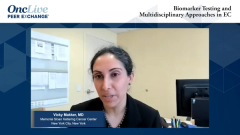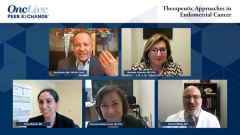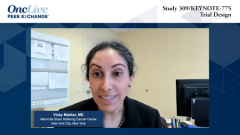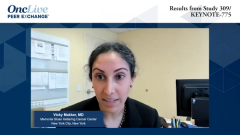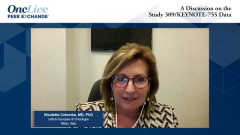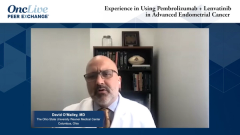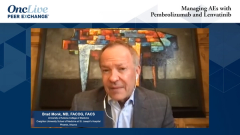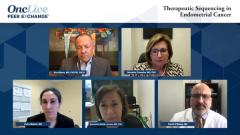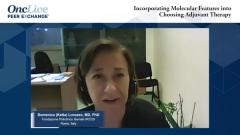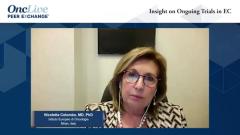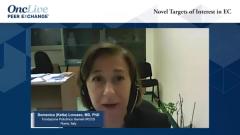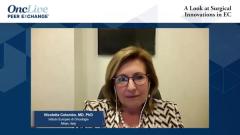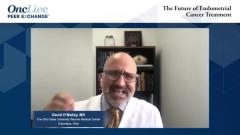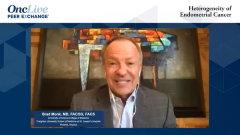
Biomarker Testing and Multidisciplinary Approaches in EC
Key opinion leaders share their thoughts on biomarker testing and multidisciplinary approaches for endometrial cancer at their institutions globally.
Episodes in this series

Brad Monk, MD, FACOG, FACS: Vicky, tell us about that; what is the role of biomarker testing at Memorial Sloan Kettering Cancer Center? I have virtually attended, and I have attended in person,
your tumor boards. We call them tumor boards in the United States. You call them, in Europe, multidisciplinary conferences. What is the molecular work-up for an endometrial cancer case?
Vicky Makker, MD: Sure; I think I will talk about 3 major biomarkers that I think are relevant. The first is PD-L1, then TMB [tumor mutational burden], and then the big class is the MMR [mismatch repair] class, those with the mismatch repair protein. We test using IHC [immunohistochemistry] as well as MSI [microsatellite instability] testing. As far as PD-L1 expression is concerned,we know that PD-L1 is frequently expressed in endometrial cancer, and that expression patterns are similar across MSS [microsatellite stable] and MSI-high tumors. We also know that expression in corresponding metastatic lesions can be discordant compared to primary tumors. These findings are particularly relevant when making treatment decisions for advanced endometrial cancers. To date, increased PD-L1 expression has been associated with a positive response to checkpoint inhibitors in cervical cancer, but in endometrial cancers, we have not seen this. In fact, we have seen responses irrespective of PD-L1 expression. This is likely not the best marker for immune checkpoint inhibitor responses in endometrial cancers.
Regarding TMB, I do think that TMB is emerging as an independent marker to identify potential responders to immune checkpoint inhibitors in endometrial cancers. There are now phase 2 data that show there is efficacy in checkpoint inhibitors for this cohort of patients. Regarding MMR testing by IHC and MSI testing by PCR [polymerase chain reaction] next-generation sequencing, it is clear that these are vitally important biomarkers in endometrial cancers, and all patients with endometrial cancer should undergo testing for this. As we know, 3% to 4% of patients with endometrial cancers have Lynch syndrome; approximately 25% to 30% have a deficiency in one of the mismatch repair proteins, seen either by IHC or MSI-high. This testing should be done universally and is recommended. At our institution, essentially all patients, either at time of resection, or at their entry point into our institution if they are coming to us with recurrent disease, do undergo routine MMR and IHC testing as well as next-generation sequencing by our MSK-IMPACT [Memorial Sloan Kettering Integrated Mutation Profiling of Actionable Cancer Targets] platform, so that we can not only understand their MSI status, but also their TMB status.
Brad Monk, MD, FACOG, FACS: Nicoletta, in Europe, I do not think that is the way it is. What do you do in Europe? You do a hysterectomy, laparoscopic, what is the testing that is done there?
Nicoletta Colombo, MD, PhD: It depends on where you are. Of course, it is not the same. In the bigger centers, at my center [Istituto Europeo di Oncologia], we do molecular characterization from the pre-operative biopsy. We do believe this is very important to guide all treatment. I saw, 2 hours ago, a young lady, a 30-year-old with early stage disease. She is asking for conservative treatment. I will, for sure, look for molecular characterization of the tumor in the biopsy to decide—along with the grade and the infiltration, of course—whether she can go with a conservative treatment or not. I do believe that we need to know what kind of tumor it is from the very beginning—from the biopsy and the biopsy before surgery.
Brad Monk, MD, FACOG, FACS: Vicky, you didn’t mention it, but TP53 mutation testing is routine, right?
Vicky Makker, MD: We do; p53 is routine at our institution.
Brad Monk, MD, FACOG, FACS: Dave, nobody mentioned HER2. Should we test for HER2 as well?
David O’Malley, MD: In serous cancers, without debate, we need to look at the HER2 status. The question becomes, should we look for this in all tumors? I think we should look in endometrioid tumors, at least in the lower-grade endometrioid tumors. That is not what our institution [The Ohio State University Wexner Medical Center] has gone to, but at the very least, when considering serous cancers, the uterus needs to have HER2/neu testing.
Domenica (Ketta) Lorusso, MD, PhD: I agree, and I think in addition to the inclusion of serous, the carcinosarcomas should also be included.
Brad Monk, MD, FACOG, FACS: Bingo.
David O’Malley, MD: That is a great point, Vicky.
Brad Monk, MD, FACOG, FACS: Ketta,nobody mentioned POLE mutations. Is that something we should test for?
Domenica (Ketta) Lorusso, MD, PhD: We routinely test for POLE, but it is not so easy.
Brad Monk, MD, FACOG, FACS: It is not so easy.
Domenica (Ketta) Lorusso, MD, PhD: With respect to the other biomarkers that can be addressed in immunohistochemistry, POLE requires next-generation sequencing. It is not so easy to manage that at all the centers, even though it is probably the most important consideration. It is the first one you must do, and then we have to search for MMRd [mismatch repair deficiency] and p53.
Brad Monk, MD, FACOG, FACS: To summarize, you do a hysterectomy, mismatch repair deficiency with the 4 proteins, p53. HER2 is considered if it is a serous tumor, and then if you can, next-generation sequencing, which will give you TMB and POLE. That is great. Dave, you surprised me a little when you said, “Oh, I can’t get my pathologist to buy into this.” Nicoletta, you’ve been a big advocate of multidisciplinary experiences. Tell us what that means in Europe and if that is common.
Nicoletta Colombo, MD, PhD: When I think of endometrial cancer, I find that everybody believes it is the easiest gynecological cancer to treat. In fact, it is the most complex cancer to treat because of the heterogeneity, because of different nuances you can have. Therefore, I think it should be treated in expert centers for ovarian cancer. That means treatment at gynecological cancer centers with expertise and with a multidisciplinary team because you need everyone here. You need surgeons, you need the radiation oncologists, and you need medical oncologists.
There should be a very profound integration among these different people because, particularly considering adjuvant treatment in the high-risk populations, it is always a big debate. It is always a big debate about what to do because everything is possible. Considering chemotherapy alone, there is the partial use of chemotherapy and radiation, and so on. Each time, each case should be deeply discussed, and all these different physicians should be present and discuss it to decide on the best treatment for every patient. A multidisciplinary team is essential for endometrial cancers.
Brad Monk, MD, FACOG, FACS: That is why I was excited to get this together because it is the toughest, and I think it is going to become clear with your hard work, and hopefully, as a result of this program. You had a comment, Dave?
David O’Malley, MD: Yes. I think when we look at these opportunities—Nicoletta, you just said, “the high-risk patient.” We do not really know who the truly high-risk patient is unless we have some of that information—if we have a measurement of the p53, or the lower-risk POLE. My biggest challenge has been consistent p53 testing. What I’m unable to get across is the necessity for POLE testing, which obviously, as Nicoletta just said, and as you alluded to also, Brad, is a much higher bar. We need to make sure that our institutions—I am at an NCCN [National Comprehensive Cancer Network] institution. Clearly, NCCN guidelines say that this is what we should be doing, yet the uptake in my own pathology department has been challenging.
Transcript Edited for Clarity


